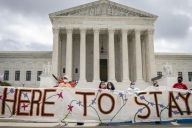You have /5 articles left.
Sign up for a free account or log in.
We had three knock-out sessions on Day 4. Nothing I say here will compare with simply watching the videos:
Here are my take-aways from each session:
Privacy: Global political bodies, not for profit organizations and foundations should be working assiduously on how to manage privacy in the electronic realm before corporate interests have acquired too much power and information to mine, aggregate and use information without regulation. Also, it is not just personally identifiable information in the sense of identity theft potential, but the "dossier" concept introduced by Dan Solove in his path-breaking book Digital Person that is in question. The power that corporate interests have to manage the lives of individuals is already overwhelming -- think of what a credit reporting agency can do about your ability to get a mortgage or a loan -- but is probably only a margin of the degree to which those interests might shape experience in the future.
Google Books: You will find no better analysis of the procedural posture, as the law school saying goes, of the case than in this video. A concise analysis at what the outcome, in any direction, portends for as a matter of policy is what grabbed me. Jonathan Band hit the nail on the head when he used the phrase "privatization of knowledge." Scary words for those of us who have given our hearts and minds to education or libraries and their systems. We must start talking about this outcome with passion and meaning, if only to understand what and why it raises disturbing concerns and questions.
Kindle: If you are concerned about accessibility, this video is a must see. The missing link to the story was the Department of Justice. Had someone from the Civil Division been there to address the question of their tactics in this matter, i.e. going after a hand full of colleges doing pilot review programs of the Kindle for textbook reading, the session might have been interesting in the point-counterpoint manner. The government-higher education relationship was a distraction from the issue at hand; making adversaries out of friends may not have been the best means to achieve their ends, especially when it is the manufacturers, not the colleges or universities, that are the target of the meaning action: making accessible devices for digitized information.
Daniel Goldstein, an attorney who represents the Federation for the Blind, blew me away with his presentation. It taught me the critical importance of this historic moment for people with disabilities to be able to have their needs addressed NOW as media translates from print to digital formats. Once the die is cast it will be unnecessarily difficult for accommodations to be made. So now is the time. And I have never heard anyone express it so compellingly. Amen.






